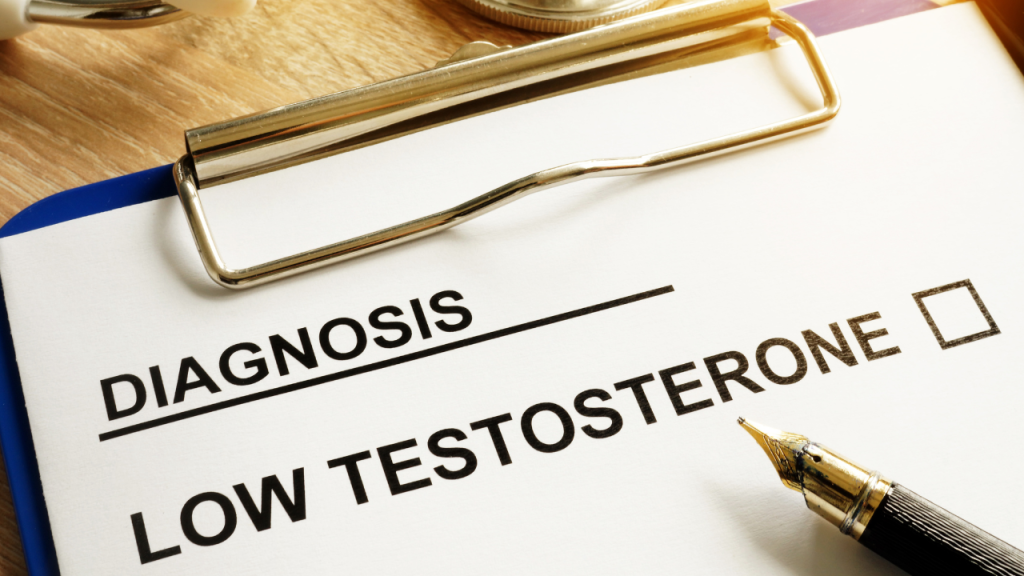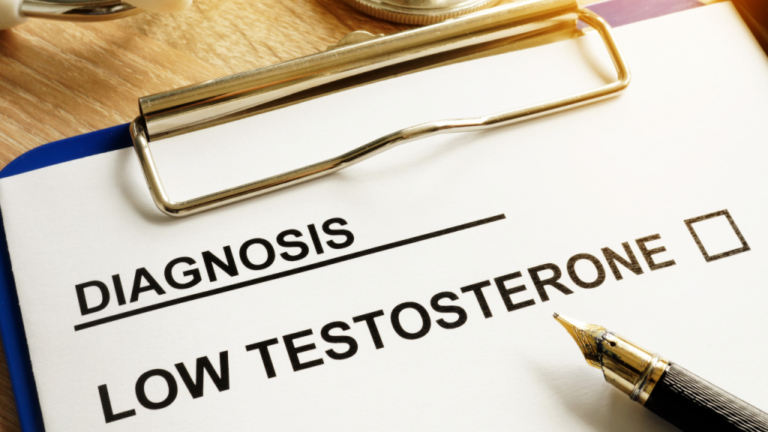Can low testosterone cause weight gain? Here’s what you need to know:
Low testosterone isn’t just about reduced energy or motivation—it has broad effects on body composition, metabolism, and weight management. Here’s how low testosterone can lead to weight gain and what you can do about it.
- Increased body fat: The role of visceral fat
Low testosterone levels are closely related to increased body fat, in particular visceral fatwhich is stored around the abdominal organs. Unlike subcutaneous fat (the layer just under the skin), visceral fat can affect organ function and increase risks for conditions such as metabolic syndrome and cardiovascular disease. Studies show that low testosterone disrupts normal fat distribution, promoting storage around internal organs rather than lean muscle. This shift not only contributes to weight gain, but also worsens insulin resistance, making it harder to manage blood sugar levels and ultimately increasing the risk of diabetes. - Loss of muscle mass and metabolic slowdown
Testosterone is integral to muscle growth and maintenance. As testosterone levels decrease, the body begins to lose muscle mass, which significantly reduces calorie burn. Muscle tissue is metabolically active, meaning it burns calories even at rest. With less muscle, your body’s basal metabolic rate (BMR) drops, making it easier to gain weight and harder to lose it. This muscle loss can create a frustrating cycle: as muscle mass decreases, fat gain accelerates, further affecting testosterone production and exacerbating the problem. - Effect on blood sugar control and diabetes risk
Testosterone helps the body maintain insulin sensitivity, which is vital for balanced blood sugar levels. Low testosterone is associated with insulin resistance, which means the body needs more insulin to manage glucose levels. As insulin resistance increases, so does the likelihood of developing type 2 diabetes, which is closely related to weight gain. Fluctuations in blood sugar also make weight loss more difficult, creating an additional hurdle for men with low testosterone trying to manage their weight. - The Estrogen Feedback Loop: How Body Fat Affects Hormone Balance
Excess body fat, especially visceral fat, produces an enzyme called aromatase, which converts testosterone into estrogen. As estrogen levels increase, the brain detects this increase and reduces testosterone production. This creates a negative feedback loop: the more body fat you accumulate, the higher your estrogen levels, which in turn further reduce testosterone, leading to even more weight gain. For men, this hormonal imbalance not only causes weight gain, but can also affect energy, mood and sexual function. - Chronic fatigue and reduced activity levels
Men with low testosterone often report chronic fatigue, which makes regular physical activity seem impossible. After a long day, the urge to go to the gym or even take a brisk walk diminishes. Over time, this reduced activity level leads to additional weight gain and reinforces the cycle of low energy and low motivation that comes with low testosterone. Physical inactivity can also affect mood, mental health and overall quality of life, further affecting weight gain and general well-being. - Bone Density and Aging
Testosterone plays a role in bone density, which is vital as men age. Low testosterone levels can lead to reduced bone density and even osteoporosis over time, increasing the risk of fractures. This may not directly contribute to weight gain, but it does highlight the comprehensive effects of testosterone on the body, highlighting why maintaining balanced levels is essential to men’s health.


Take Control of Your Health: Steps to Treat Low Testosterone and Manage Weight
If these symptoms sound familiar, taking action can make a real difference. Here’s how to get started:
- Schedule a comprehensive hormone evaluation
Start by booking a hormone panel that includes measurements for total and free testosterone, estrogen, thyroid hormones, cortisol, and markers of insulin sensitivity. This comprehensive data allows your healthcare provider to identify where support is needed, ensuring you receive a treatment plan that fits your specific needs. - Focus on muscle building and cardio
Exercise is a powerful tool for increasing testosterone. Resistance training, especially weight lifting, encourages muscle growth and directly supports higher testosterone production. High Intensity Interval Training (HIIT) is another great option, known for its ability to boost testosterone. Aim to include these types of workouts in your routine 3-4 times per week for best results. - Eat a balanced diet rich in essential nutrients
Certain nutrients such as zinc, vitamin D and healthy fats are vital for testosterone production. Foods such as lean meats, fish, leafy vegetables, nuts and seeds provide these essential nutrients. Also, reducing processed foods and sugar helps keep blood sugar stable and supports metabolic health, creating a favorable environment for testosterone balance. - Get enough restful sleep
Sleep is critical to hormone health, and poor sleep is directly linked to lower testosterone levels. Aim for 7-8 hours of quality sleep a night. Studies have shown that men who sleep less than five hours a night often have significantly lower testosterone levels than those who get adequate rest. - Consider medical treatments if necessary
If lifestyle changes are not enough, medical treatments such as Testosterone replacement therapy (TRT) may be an option. TRT can help restore testosterone to healthy levels, treating both physical and mental symptoms. Always consult a trusted healthcare provider to discuss the best approach for you.
Begin your journey at the Men’s Health Center of Phoenix
At the Phoenix Men’s Health Center, we understand the impact of testosterone on men’s health. From detailed hormone assessments to personalized treatment plans, we’re here to help you regain energy, lose weight and restore balance. Don’t let low testosterone hold you back – take the first step toward a healthier, more vibrant life today.
**This content is for informational purposes only and is not intended as medical advice. Please consult a healthcare professional before starting any treatment. Individual results may vary depending on health conditions and other factors.
